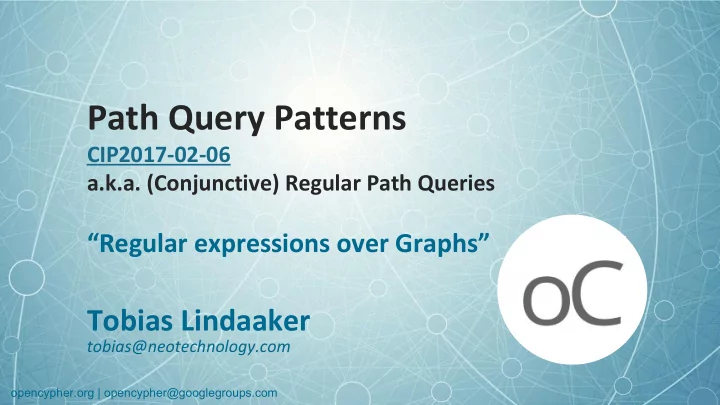

Path Query Patterns CIP2017-02-06 a.k.a. (Conjunctive) Regular Path Queries “Regular expressions over Graphs” Tobias Lindaaker tobias@neotechnology.com opencypher.org | opencypher@googlegroups.com opencypher.org | opencypher@googlegroups.com
Find complex connections MATCH (a)-[~cousin]-(b) MATCH (me)-[:ALLY | [:ENEMY :ENEMY]]-(friend) MATCH (x)-[[:A :B]+ :C+ [:B :A]*]->(y) MATCH p = (a)-[[:KNOWS | :LOVES]+]->() opencypher.org | opencypher@googlegroups.com
Syntax design philosophy ● Reuse and extend existing syntax ● Direct notation for common simple patterns ● Allow for complex patterns ● Avoid repetition and ceremony opencypher.org | opencypher@googlegroups.com
Improved since last time ● Shorthand syntax for node labels! ● Shorthand syntax for matching any edge! ● Shorthand syntax for property predicates! ● Declared Path Patterns are scoped per query And declared at the head of the query ● Non-repetitive syntax for Declared Path Patterns opencypher.org | opencypher@googlegroups.com
Composition of Patterns Regular Expressions over Paths ● Sequence / Concatenation: ()-[ � � ]-() ● Alternative / Disjunction: ()-[ � | � ]-() ● Transitive closure: ()-[ � *]-() // zero or more times ()-[ � +]-() // one or more times ()-[ � *n..]-() // n or more times ()-[ � *n..m]-() // at least n , at most m ● Overriding direction for sub-pattern: ()-[< � ]-() ()-[ � >]-() ()-[< � >]-() opencypher.org | opencypher@googlegroups.com
Predicates for Path Patterns ● Edge Label ()-[:KNOWS]-() ● Node Label ()-[(:Person)]-() ● Edge Properties ()-[:ROAD{length:12}]-() ● Node Properties ()-[({year:2017})]-() ● Edges with any label, and matching empty path ()-[-]-() ()-[()]-() ● Grouping of expressions ()-[[:KNOWS :LOVES]+]-() opencypher.org | opencypher@googlegroups.com
Declared Path Patterns ● Referenced using ~ MATCH (a)-[~my_pattern]-(b) ● Declaration: PATH PATTERN my_pattern = ()-[:FOO :BAR* :BAZ]-() ● Makes the pattern language Context Free opencypher.org | opencypher@googlegroups.com
Advanced property tests ● PATH PATTERN same_color_nodes = (a)-[-]-(b) WHERE a.color = b.color MATCH (x)-[~same_color_nodes+]-(y) ● PATH PATTERN older_friends = (a)-[:KNOWS]-(b) WHERE b.birthday < a.birthday opencypher.org | opencypher@googlegroups.com
Conjunctive Path Queries ● PATH PATTERN friends_in_same_city = (a)-[:KNOWS]-(b) WHERE EXISTS { (a)-[:LIVES_IN]->()<-[:LIVES_IN]-(b) } ● One pattern must be designated the main pattern ● Other patterns are put in WHERE ● The main pattern is presented when binding a matched path: MATCH friendships = (a)-[~friends_in_same_city+]-() opencypher.org | opencypher@googlegroups.com
Balanced Path Matching Classic Context Free use case // treats siblings as “zeroth cousin” PATH PATTERN cousin = ()-[:PARENT> [() | ~cousin] <:PARENT]-() MATCH rel=(me)-[~cousin]-(cus) WHERE length(rel) > 2 // filter away siblings opencypher.org | opencypher@googlegroups.com
Expressive power compared to academic languages ● Covers all of GXPath - except negation ● Weaker scoping reach than Regular Expressions with Memory ○ Variables only reach within single Declared Path Pattern ● Defines a Context Free Language over paths rather than just a Regular Language ● More sophisticated data tests than GXPath opencypher.org | opencypher@googlegroups.com
Sophisticated data test PATH PATTERN same_pet_name = (a)-[:KNOWS]-(b) WHERE EXISTS { MATCH (a)-[:OWNS]-(petA:Animal), (b)-[:OWNS]-(petB:Animal) WHERE petA.name = petB.name } MATCH peculiar_friends = (x)-[~same_pet_name*]-() opencypher.org | opencypher@googlegroups.com
Alternative syntax ideas ● Differentiate between single edge and path MATCH (a)-[single:EDGE]-(and_a)-/~path*/-() ● Single edge matching allows variable binding ● Binding a path results in a whole path value bound opencypher.org | opencypher@googlegroups.com
Next steps “Battle testing” ● Prototype implementation ● Try to express interesting queries ○ Needs to find / define interesting queries ● Measure up against “yardstick queries” ● Academic evaluation of ○ expressive power ○ computational complexity opencypher.org | opencypher@googlegroups.com
Yardstick queries that I have not yet been able to express ● Paths where the property value differs in all nodes ○ quite possibly not tractable ● Paths where the property value in all subsequent nodes differs from the first node opencypher.org | opencypher@googlegroups.com
Recommend
More recommend